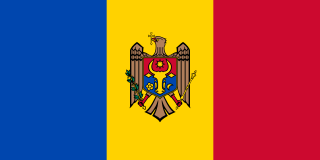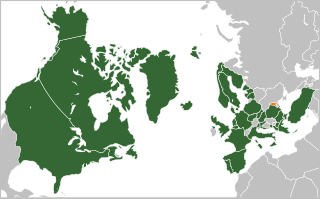Related Research Articles
The history of Moldova can be traced to the 1350s, when the Principality of Moldavia, the medieval precursor of modern Moldova and Romania, was founded. The principality was a vassal of the Ottoman Empire from 1538 until the 19th century. In 1812, following one of several Russian–Turkish wars, the eastern half of the principality, Bessarabia, was annexed by the Russian Empire. In 1918, Bessarabia briefly became independent as the Moldavian Democratic Republic and, following the decision of the Parliament, united with Romania. During the Second World War it was occupied by the Soviet Union which reclaimed it from Romania. It joined the Union as the Moldavian ASSR, until the dissolution of the USSR. In 1991 the country declared independence as the Republic of Moldova.

Moldova, officially the Republic of Moldova, is a landlocked country in Eastern Europe, on the northeastern corner of the Balkans. The country spans a total of 33,483 km2 and has a population of approximately 2.5 million as of January 2023. Moldova is bordered by Romania to the west and Ukraine to the north, east, and south. The unrecognised breakaway state of Transnistria lies across the Dniester river on the country's eastern border with Ukraine. Moldova is a unitary parliamentary representative democratic republic with its capital in Chișinău, the country's largest city and main cultural and commercial centre.

The Government of Moldova is the government of the Republic of Moldova. It is housed on the Government House at the Great National Assembly Square in Chișinău, the capital of Moldova. Currently, the President of Moldova is Maia Sandu, while the Prime Minister of Moldova is Dorin Recean. The current ruling cabinet of Moldova is the cabinet of Dorin Recean, incumbent since 16 February 2023.

Moldova–Russia relations are the bilateral relations between the Republic of Moldova and the Russian Federation, two Eastern European, post-Soviet, ex-communist countries. Russian support for the self-proclaimed Pridnestrovian Moldavian Republic (Transnistria) and a substantial Russian military presence therein strained Moldovan relations with Russia.

Moldova–Ukraine relations are the bilateral/diplomatic/foreign relations between the sovereign states of Moldova and Ukraine. The Moldova–Ukraine border is 985 kilometers. Ukrainians are the third largest ethnic group in Moldova, behind Moldovans and Romanians. Both countries were former republics of the Soviet Union and are also the poorest countries in Europe. Both countries have applied for membership to join the European Union in 2022.

Official relations between Moldova and NATO began in 1992 when Moldova joined the North Atlantic Cooperation Council. However, as Moldova's neutrality is enshrined in its constitution, there are no official plans for Moldova to join the organization.

Dorin Recean is a Moldovan economist and politician serving as Prime Minister of Moldova since February 2023. Since 2022 he has also served as Presidential Advisor on Defense and National Security, and Secretary of Moldova's Supreme Security Council. He previously served as Minister of Internal Affairs of Moldova from July 2012 to February 2015. He has extensive experience in the private sector and in the IT industry with a specialisation in data, including big data, and information analysis. He also worked in development institutions and was previously a lecturer at several universities.

Maia Sandu is a Moldovan politician who has been the President of Moldova since 24 December 2020. She is the founder and former leader of the Party of Action and Solidarity (PAS) and former Prime Minister of Moldova from 8 June 2019 until 14 November 2019, when the government collapsed after a vote of no-confidence. Sandu was Minister of Education from 2012 to 2015 and member of the Parliament of Moldova from 2014 to 2015, and again in 2019. Sandu was elected President of Moldova in a landslide victory during the 2020 Moldovan presidential election. The first female president of Moldova, Sandu is a strong supporter of the accession of Moldova to the European Union, overseeing Moldova's granting of candidate status, and is considered 'pro-Western'. She has criticised and opposed Russia's invasion of Ukraine and supported subsequent steps to reduce Moldova's economic dependence on Russia, frequently expressing sympathy and support for Ukraine in the conflict. Sandu has made anti-corruption, economic reform and liberalisation a central part of her political platform, as well as closer integration with Europe. In February 2023, she accused Russia of seeking to stage a coup of the Moldovan government and has continued to seek to reduce Russia's influence over the country.
Russian involvement in regime change describes activities by the Russian government to replace foreign regimes through overt or covert interventions since the dissolution of the Soviet Union in 1991.

Transnistria–Ukraine relations is the bilateral relationship between the Pridnestrovian Moldovan Republic and Ukraine. Ukraine does not officially recognize the independence of Transnistria. Nevertheless, it maintains special relations with Transnistria in the political, cultural and economic spheres.
Events in the year 2021 in Ukraine.
Events from the year 2022 in Moldova.

The 2022 Transnistria attacks were a series of five incidents reported in the Eastern European breakaway state of Transnistria, internationally recognized as part of Moldova, that occurred in 2022 between 25 and 27 April, on 6 May and on 5 June. No casualties were reported, but material damage did occur.

Since the outbreak of the Transnistria conflict, there have been efforts and proposals to reincorporate the unrecognized state of Transnistria into Moldova.

The Second European Political Community Summit was a meeting of the European Political Community held on 1 June 2023 at Mimi Castle, Bulboaca, 35 kilometres from Chișinău, Moldova. It was attended by forty-five heads of states and governments, as well as leaders of European Union institutions.

On 18 September 2022, protests in Moldova began in the capital city of Chișinău, demanding the resignation of the country's pro-Western government, amid an energy crisis causing rising natural gas prices and inflation, caused in part by the war in Ukraine.
In November 2021, top Ukrainian government officials outlined allegations of a plot to overthrow the democratically elected government of Ukraine which was to take place in early December of that year. The coup plot was allegedly orchestrated by Russia. The Russian government denied any involvement. Some months later, Russia launched an invasion of Ukraine, with the toppling of the Ukrainian government being one of its objectives.
Starting in late 2022, Moldova suffered an energy crisis, the worst since its independence. Hugely influenced by the Russian invasion of Ukraine, caused when Russia's Gazprom reduced supplies.
Events from the year 2023 in Moldova.
Following the Russian invasion of Ukraine, Moldova accepted Ukrainian refugees, opened a bank account for donations, and unofficially imposed sanctions on Russia.
References
- 1 2 3 Journal, Margherita Stancati / Photographs by Ramin Mazur for The Wall Street. "Moldova, Under Pressure From Russia's War on Ukraine, Fears It Could Be Next". WSJ. Retrieved 23 February 2023.
- ↑ "Moldova warns of Russian 'psy-ops' as tensions rise". BBC News. 23 February 2023. Retrieved 24 February 2023.
- ↑ "Russia's planned Cousin Moldova reminds us why Ukraine must win this war" . Retrieved 9 March 2023.
- 1 2 3 4 5 6 "Has Russia been planning a coup in Ukraine's neighbour, Moldova? Here's what we know". ABC News. 14 February 2023. Retrieved 14 February 2023.
- ↑ Pronczuk, Monika (26 April 2022). "Explosions rattle a breakaway region in Moldova, raising fears of a broader war". The New York Times. ISSN 0362-4331 . Retrieved 22 February 2023.
- ↑ Kingsley, Patrick (6 March 2022). "On Ukraine's Border, Moldovans Wonder: Where Will Putin Stop?". The New York Times. ISSN 0362-4331 . Retrieved 22 February 2023.
- ↑ Pronczuk, Monika; Gettleman, Jeffrey (23 April 2022). "Rattled by Ukraine War, Moldova Strives to Dodge Russia's Long Shadow". The New York Times. ISSN 0362-4331 . Retrieved 22 February 2023.
- ↑ Rankin, Jennifer (9 February 2023). "Zelenskiy pushes for EU membership and raises fears of Russian designs on Moldova". The Guardian. ISSN 0261-3077 . Retrieved 22 February 2023.
- ↑ "Moldovan government resigns in wake of multiple crises". 10 February 2023.
- ↑ Rankin, Jennifer (13 February 2023). "Moldova president accuses Russia of plotting to oust pro-EU government". The Guardian. ISSN 0261-3077 . Retrieved 22 February 2023.
- ↑ "Russia is planning coup in Moldova, says President Maia Sandu". POLITICO. 13 February 2023. Retrieved 22 February 2023.
- ↑ "Прем'єр Молдови визнав загрозу російської атаки на Кишинів". Суспільне.
- ↑ "Premierul Dorin Recean: Rusia a încercat să preia Aeroportul Chișinău. Există mai multe scenarii de destabilizare a Moldovei". Stirileprotv.ro.
- ↑ "National Security Council Coordinator for Strategic Communications John Kirby commented on Russian attempts to destabilize Moldova". U.S. Embassy in Moldova. 10 March 2023.
- ↑ Ostiller, Nate (6 October 2023). "FT: Moldovan president says Prigozhin attempted coup in Moldova". The Kyiv Independent.
- ↑ "Moldova briefly shuts airspace after report of balloon-like object". Reuters. 14 February 2023. Retrieved 15 February 2023.
- ↑ Latham-Coyle, Harry (14 February 2023). "Fans banned from Europa Conference League match amid Moldovan fears of Russian coup". The Independent . Retrieved 14 February 2023.
- ↑ "Serbia, Montenegro Demand Explanation After Moldova Coup Plot Claim". Balkan Insight . 14 February 2023. Retrieved 14 February 2023.
- 1 2 Erizanu, Paula (12 March 2023). "Moldova police arrest members of Russian-backed network over unrest plot". The Guardian. ISSN 0261-3077 . Retrieved 13 March 2023.
- 1 2 "Moldova police say they foiled Russia-backed plot to cause unrest during protest". independent. Retrieved 12 March 2023.
- 1 2 Tanas, Alexander (22 February 2023). "Putin cancels decree underpinning Moldova's sovereignty in separatist conflict". Reuters. Retrieved 22 February 2023.